



Hall 1










May has arrived, bringing the brightly intense Taiwan early-summer sun with it. We’ve cooked up a picnic basket filled with tasty adventure and experience suggestions for you as you consider how to spend your time with us.
The destination for our series of feature articles this issue is Pingtung County’s north, in the far south of Taiwan. Within a single day you can find yourself capturing camera shots of the white-capped Taiwan Strait, the deep and ruggedly twisting valleys of the central mountains, and the farm-carpeted flatlands and easyliving, modest-sized city of Pingtung in between.
It’s rambles on the flatlands in Pingtung City and two townships south of it in our main article. A key theme is heritage sites given new missions – a military-office dormitory complex now a cultural-creative hub, a paper mill now the heart of a new park, and so on.

In our three other Pingtung County articles, you spend time in the mountains, beside the Taiwan Strait, and on a train tour from the Pingtung side through the mountains to Taitung County on the Pacific side. The pivot in the mountains article is the villages of Pingtung’s indigenous peoples, located in the Maolin National Scenic Area. In the coastal-region article you learn of the myriad ways to have recreational fun around the Dapeng Bay National Scenic Area; the bay is a giant protected lagoon once used as a Japanese seaplane base and for oyster production. On your railroad excursion you ride the South Link Line on the Breezy Blue heritage tourist train, launched in 2021, hopping off to explore the stations and other most interesting traveler attractions along the way.
Elsewhere, in our regular Expert Talk file our conversation is with the founders of an indigenous enterprise called Nature, based in Hualien County on the east coast. The duo – one from the Atayal tribe, one from the Amis – creates elegant and ecofriendly daily life products from an unusual material, betel-nut leaf sheaths.
In our Good Food department you’ll be savoring the wonderful world of artisanal chocolate in Taipei, sitting down to the delicious artworks crafted by three entrepreneurs with ambitious plans to put Taiwanese chocolate front and center on the global stage.
Travel in Taiwan – among the best of ways you could spend your early-summer days!
Travel in Taiwan
The Official Bimonthly English Magazine of the Taiwan Tourism Bureau (Advertisement)
MAY/JUNE, 2023
Tourism Bureau, MOTC
First published Jan./Feb. 2004
ISSN: 18177964 GPN: 2009305475
Price: NT$200
中華郵政台北雜字第1286號執照登記為雜誌交寄
Copyright @ 2023 Tourism Bureau. All rights reserved. Reproduction in any form without written permission is prohibited.
PUBLISHER
EDITING CONSULTANT
PUBLISHING ORGANIZATION
CONTACT PRODUCER
ADDRESS E-MAIL
GENERAL MANAGER
EDITOR IN CHIEF
ENGLISH EDITOR
DIRECTOR OF PLANNING & EDITING DEPT
MANAGING EDITOR
EDITORS
CONTRIBUTORS
PHOTOGRAPHERS
DESIGNERS
ADMINISTRATIVE DEPT
Taiwan Tourism Bureau
T. C. Chou
TAIWAN TOURISM BUREAU, MINISTRY OF TRANSPORTATION AND COMMUNICATIONS
International Division, Taiwan Tourism Bureau
Add: 9F, 290 Zhongxiao E. Rd., Sec. 4, Taipei City, 10694, TAIWAN
Tel: 886-2-2349-1500 Fax: 886-2-2771-7036
E-mail: tbroc@tbroc.gov.tw


Website: http://taiwan.net.tw
Vision Creative Marketing & Media Co.
1F, No. 5, Aly. 20, Ln. 265, Sec. 4, Xinyi Rd., Taipei City 10681, Taiwan
Tel: 886-2-2325-2323 Fax: 886-2-2701-5531 editor@v-media.com.tw
David Hu
Johannes Twellmann
Rick Charette
Joe Lee
Anna Li
Masako Takada, Sophia Su
Rick Charette, Ami Barnes, Han Cheung
Ray Chang, Alan Wen, Yang Jen Po
Ian Tsai , Hsieh Yun-jhen
Lily Wan, Hui-chun Tsai, Xiou Mieng Jiang
This magazine is printed on FSC TM COC certified paper. Any product with the FSC TM logo on it comes from a forest that has been responsibly maintained and harvested in a sustainable manner.
This magazine was printed with soy ink. Soy ink is said to be more environmentally friendly than petroleum-based ink and to make it easier to recycle paper.
MAGAZINE IS SOLD AT:
1. Wu-Nan Culture Plaza, No. 6, Zhongshan Rd., Central Dist., Taichung City 40043 886-4-2226-0330 http://www.wunanbooks.com.tw/
2. National Bookstore, 1F., No. 209, Songjiang Rd., Zhongshan Dist., Taipei City 10485 886-2-2518-0207 http://www.govbooks.com.tw/
WHERE YOU CAN PICK UP A COPY OF TRAVEL IN TAIWAN
ABROAD
Offices of the Taiwan Tourism Bureau in Beijing, Shanghai, Hong Kong, Singapore, Thailand, Vietnam, Kuala Lumpur, Seoul, San Francisco, New York, Los Angeles, Frankfurt, and London. Taiwan Representative Offices; Overseas Offices of the Ministry of Economic Affairs; Overseas Offices of the Central News Agency; EVA Air, and other selected international airways; selected travel agencies in Asia, North America, and Europe; and other organizations.
IN TAIWAN
Tourism Bureau Visitor Center; Tourism Bureau; Taiwan Visitors Association; foreign representative offices in Taiwan; Tourism Bureau service counters at Taiwan Taoyuan Int’l Airport and Kaohsiung Int’l Airport; major tourist hotels; Taipei World Trade Center; VIP lounges of international airlines; major tourist spots in Taipei; visitor centers of cities and counties around Taiwan; offices of national scenic area administrations; public libraries
ONLINE
Read Travel in Taiwan online at www.travelintaiwan.net
Find back issues (PDF version) on the publication platform issuu at issuu.com/travelintaiwan
Website issuu (PDF)
RAMBLES THROUGH PINGTUNG NORTH Central Flatlands, Mountainous Interior, Strait-side Coastal Zone
28
PINGTUNG / RAILWAY
THE “BREEZY BLUE” RAILWAY EXPERIENCE
Taiwan Strait, Rugged Mountains, Pacific Ocean
32 PINGTUNG / LOCAL STAY

BREEZY DAYS BY DAPENG BAY Comfy Inns & Recreation Options Around the National Scenic Area
38
GOOD FOOD / CHOCOLATE

44
LITTLE THINGS / ECO-FRIENDLY PRODUCTS
SINGLE USE NO MORE Modern Consumers Bring their Own Cups
46
EXPERT TALK / INDIGENOUS ART
TAKEN FROM NATURE
Two Indigenous Artists Creating Unique Products Using Betel-Nut Leaf Sheaths
INDIGENOUS VILLAGES IN PINGTUNG Deep Mountain Valleys and Plateaus + Native Fare and Crafts
MOUTHFULS OF HAPPINESS
In Search of Artisanal Chocolate in Taipei

LUKANG TOWNSHIP 1
JUNE 3
One of the big three annual traditional festivals in Taiwan, the Dragon Boat Festival is best known for dragon-boat races. These are staged on rivers and lakes in more than a dozen locations around the island, including the Keelung River in Taipei and Kaohsiung’s Love River. In recent years, the competition in Lukang town, which takes place on the Fulu River, has emerged as perhaps the most attractive dragon-boat race event. Making it special is the fact that the races take place in the late afternoon and evening with boats, bridges, and riverbanks colorfully illuminated. Many of the town’s streets are also lavishly decorated for the occasion. Lukang is a history-rich old settlement, once a thriving saltwater port, that is great for nostalgia trips for those who want to experience the Taiwan of yesteryear. tourism.chcg.gov.tw (Changhua Travel)

YILAN COUNTY 4
JULY 2~AUGUST 14
YILAN INT’L CHILDREN’S FOLKLORE AND FOLKGAME FESTIVAL 宜蘭國際童玩藝術節
Each year as the heat of summer builds, this festival helps everyone, especially children, to cool down and have fun in a large pool-facility area. The event, held in Yilan County’s Dongshan Township, provides more than just refreshing pools, water slides, and water cannons. It is an international happening with many exciting stage performances by troupes from Taiwan and abroad presenting entertaining and educational shows. A wide range of classes and DIY sessions are also offered, giving children many opportunities to learn. Side activities include dragon-boat paddling, sailing, and kayaking on the Dongshan River, which is adjacent to the festival venue. In the evening you can watch a mesmerizing water and light show. www.yicfff.tw
(Yilan Int’l Children’s Folklore and Folkgame Festival)
This festival combines the beauty of Taiwan’s East Coast region with the beauty of outdoor installation art and music. Each year, the organizer invites artists from Taiwan and abroad to create installation artworks that blend nicely with the natural environment of the East Coast National Scenic Area. A central element of the festival is the romantic Moonlight Sea Concert series, featuring wellknown musicians from around Taiwan. As the concerts are timed to coincide with days around the full moon, spectators can (weather permitting) see the moonrise and the moonlight reflection on the waters of the Pacific Ocean. Moonlight Sea Concert shows in 2023: June 21/22, July 3/4, August 1/2, and September 1/2. www.teclandart.tw (TEC Land Arts Festival), www.eastcoast-nsa.gov.tw (East Coast National Scenic Area)
JULY-AUGUST NANTOU COUNTY 5
Each year from late July to late August a meteor shower known as the Perseids can be seen in the clear night sky of central Taiwan’s Nantou County. This is one of three major meteor showers each year. The most spectular display can be seen around August 13, with up to 100 shooting stars per hour lighting up the night-sky canvas. The best spots for watching this spectacle are conveniently reached locations with low light pollution, such as Hehuanshan (Mt. Hehuan; certified as an International Dark Sky Space by the International DarkSky Association), Sun Moon Lake, and the forest areas of Xitou and Sanlinxi. travel.nantou.gov.tw (Nantou Travel)
TAITUNG COUNTY 3
JUNE 30~AUG. 28
TAIWAN INTERNATIONAL BALLOON FESTIVAL 臺灣國際熱氣球嘉年華
This is one of the biggest and best tourism events during the summer months in Taiwan, and one of the top hot-air balloon festivals worldwide. The venue is the Luye Highland in Taitung County, about 20km north of Taitung City, a site with perfect conditions for air sports such as paragliding. The festival attracts not only a large number of tourists, but also hot-air balloon pilots from abroad, who bring balloons of intriguing shapes and colors with them. For those who want to experience the sensation of slowly rising into the sky, both tethered and free flights are available. The former takes you about 20 meters off the ground, while the latter allows you to fly, in much longer sessions, over the beautiful East Rift Valley countryside. balloontaiwan.taitung.gov.tw
HUALIEN COUNTY 6
JULY 21~23
HUALIEN COUNTY JOINT INDIGENOUS HARVEST FESTIVAL 花蓮縣原住民族聯合豐年祭
This festival, celebrating indigenous culture and promoting sustainable development and continuation, has grown into a major tourist event giving visitors a chance to see up close how the indigenous people in eastern Taiwan each year celebrate their harvest with riveting song and dance. The event is attended by members of six tribes who call Hualien their home, the Amis, Bunun, Kavalan, Sakizaya, Sediq, and Truku. The venue has areas with stalls selling indigenous food, handicrafts, and local produce, giving sightseers the chance to taste local delicacies and marvel at indigenous craftsmanship.
www.erv-nsa.gov.tw
(East Rift Valley National Scenic Area)








Another summer has arrived! The sun is out and there is so much fun to be had around Taiwan. What are you waiting for! Explore!

The world’s first capsule hotel, aka pod hotel, was opened in Osaka, Japan, in 1979. Today these hotels can be found around the world from Indonesia to Iceland, but did you know that you can opt for this most basic of accommodations in Taoyuan International Airport as well? If you have a long layover at TPE and you don’t want to spend your time in a waiting hall or a full-fledged hotel, consider checking out the CHO Stay Capsule Hotel, on the 5th floor of Terminal 2’s Departure Hall. www.chostay.com

Once an uninviting gray industrial area, Kaohsiung Port and its surroundings have been transformed in recent decades to become tourist magnets with modern shining edifices and rejuvenated heritage complexes. One of the city’s latest waterside architectonic gems is the Kaohsiung Port Cruise Terminal. Resembling a whale raising its head, the terminal is large enough to allow the world’s largest cruise ships to dock. Apart from marveling at the stunning design of the building, visitors also come to take a good look at docked ocean liners from the terminal’s observation platform. kh.twport.com.tw/en/ (Chinese)
Taking the Alishan Forest Railway from central Chiayi City on the coastal plain up to the high mountains of the Alishan National Scenic Area is one of the most special tourist experiences you can have in Taiwan. This experience has now become even more pleasant with the introduction of new railway carriages. Visually appealing outside and inside thanks to the generous use of local cypress wood, these cars also have especially comfortable seats and extra-large windows for unobstructed views of the wondrous scenery along the way. afrch.forest.gov.tw/En

1. The Archipelago | 凱渡廣場酒店
Located at Wushi Harbor in Yilan County; 285 guestrooms; grand opening March 2023 www.archipelago.com.tw

2. Four Points by Sheraton Taipei Bali | 八里福朋喜來登酒店
Located in Bali District of New Taipei City; 241 guestrooms; grand opening March 2023 www.facebook.com/new.fourpointstaipeibali


Central Taipei City is home to a large number of old houses dating from the Japanese colonial era, easy to recognize as one- or two-story wooden or red-brick structures with slanted black-tile roofs. Many of these heritage houses have been thoughtfully restored and given new life as cultural spaces, cafés, shops, and restaurants. One building complex that was recently opened after restoration is named Rongjin Gorgeous Time. Located close to MRT Dongmen Station, this long row of buildings, now housing small restaurants, cafés, and shops, is especially photogenic in the evening when it is illuminated very tastefully. rongjintimes.com


Located northwest of Tainan City’s urban core, Qigu District is a flat coastal area well-known for its wetlands (great for birdwatching; black-faced spoonbills in the winter) and salt fields (salt production was a main industry here in the past). To learn more about the area before exploring it, head to the Qigu Visitor Center, run by the Southwest Coast National Scenic Area Administration. A modern facility with a striking design, the center provides helpful information and is also a popular IG check-in spot. A recent addition to the site is tiny Island No. 6, reached via a 60m-long path, home to a small art installation in the shape of a house seemingly made of salt. swcoast-nsa.travel

Located a 10-min. walk southeast of Taichung Railway Station, this is a new shopping mall conceived by Japanese real-estate developer Mitsui Fudosan. Home to about 300 stores, the mall serves as a one-stop center for shopping, dining, and entertainment. It consists of two large buildings connected by a footbridge, which crosses over a street. The South Building includes the largest collection of Japanese specialty stores in Taiwan, while the North Building has a collection of small and medium-sized stores. www.mitsui-shopping-park.com.tw

TAIWAN INTERNATIONAL PERCUSSION CONVENTION


臺灣國際打擊樂節
May 19~June 6
National Kaohsiung Center for the Arts ( Weiwuying ) ( Kaohsiung City )
Organized by the Ju Percussion Group and held since 1993, this tri-annual event brings together percussionists from Taiwan and abroad. The purpose of this convention is to enhance mutual understanding and experience exchange in the international percussion community and to increase the popularity of percussive music in Taiwan. Taking part are 12 groups from 10 countries, including Les Percussions de Strasbourg from France and the Ondekoza group from Japan.
www.npac-weiwuying.org
TITUS ANDRONICUS
泰特斯
May 27~June 4
National Theater ( Taipei City )
Performed on this occasion by local ensemble Shakespeare’s Wild Sisters Group, Titus Andronicus was Shakespeare’s first tragedy, believed to have been written between 1588 and 1593. Its plot is filled with dreadful sights of limb-chopping, human-burning sacrifices, rape, tongue-cutting, and man-eating that are so violent as to make it less “Shakespearean,” as others have argued. However, it might also be true that in Titus Andronicus, an embryo of his four major tragedies, young Shakespeare revealed his fearless, or naive, raw energies against society.
npac-ntch.org
SPLENDORS OF THE BIBLIOTECA APOSTOLICA VATICANA AND RARE BOOKS FROM THE MING AND QING IMPERIAL LIBRARIES
「梵蒂岡宗座圖書館珍藏」暨「明清宮廷藏書」特展

Until July 16
National Palace Museum ( Taipei City )
This is a fascinating meeting of rare books from the libraries of the Vatican in Rome and the Ming/Qing court in China. The Bibliotheca Apostolica Vaticana is the library of the popes. Inaugurated in the mid-15th century, it was conceived as an institution “for the common convenience of learned men.” Today, it is arguably one of the largest and most important research libraries in the world. This exhibition marks the first presentation at the National Palace Museum of invaluable Western and Chinese antiquarian texts in their respective historical and cultural context.
www.npm.gov.tw

Until June 4
Taipei Fine Arts Museum ( Taipei City )
This exhibition addresses the future of the human body in the Anthropocene era (a term unofficially used to describe the most recent period in the Earth’s history). The hyper-realistic and realistic sculptures in this exhibition offer some possible answers to the question of how biogenetics might change the appearance of humans and other life forms in the future, and how the lines between nature, science, and culture are becoming increasingly blurred.
www.tfam.museum

Until May 28
Taiwan Traditional Theatre Center (Taipei City)
This will be the sixth edition of the Taiwan Traditional Theatre Festival. Staged at the Taiwan Traditional Theatre Center, the theme is Hero Hyperspace and it will feature 12 performing groups staging 53 performances, including traditional opera and interdisciplinary productions. The two flagship productions at the main theater and experimental theater will be Tears of the Phoenix, co-created by Shiu-Kim Taiwanese Opera Troupe and Our Theatre, and Blood Brothers by Jin Kwei Lo Puppetry Company. tttc.ncfta.gov.tw
台北新藝術博覽會
May 5~8
Taipei World Trade Center ( Taipei City )
Held annually since 2011 by the Taiwan International Contemporary Artist Association, Art Revolution Taipei (A.R.T.) is a leading art fair in Asia. Each year hundreds of artists from around the world participate and showcase their creations. The fair’s motto is “placing artists front and center” to break with the traditional gallery-centric format of other art fairs. The show is organized around booths serving as artists’ solo exhibition spaces. A.R.T. has become an iconically humane art show with its own personality. arts.org.tw


The northern region of Pingtung County, in Taiwan’s far south, is not given much space in the big international English-language travel guides, but there’s much that’s rewarding for the traveler from overseas to do and see. And new attractions keep coming on-line, many of these giving new tourism missions to old spaces – as you’re about to learn.
When you mention Pingtung County to Taiwan locals and expats, what first comes to mind for most is Kenting National Park on the island’s south tip, a balmy Hawaii-style surf-fun hotspot. But there’s much, much more to the county than this. This issue we bring you Pingtung’s north, also filled with worthwhile tourist attractions. There’s a farmfecund plains area in the center, mountainous area on the east and south with tribal-culture riches, and a west-side Taiwan Strait coastal area teeming with marine-ecology recreational bounty. We explore these various areas in separate articles, starting here with Pingtung City and nearby areas on the central flatlands.


The word “Pingtung” means “east of Mount Banping.” This low mountain is just off the coast in Kaohsiung City’s urban core, one of the south’s earliest areas of Han Chinese settlement. Small Pingtung City sits on the wide Pingtung Plain, an important commercial-farming region.
This young attraction is about six blocks northwest of Pingtung Railway Station. A cultural-creative platform for young local entrepreneurs, with over 30 start-up ventures, this was once a neighborhood of Forestry Bureau dormitory residences. Reflecting the quest of elevated life aesthetics pursued by today’s resident creative teams, the neighborhood itself has been enchantingly re-imagined as a single integrated work of art, each individual building exterior a dynamic 3D mural canvas.

The colors and air of exotic European city-style romance become especially vivid at night when the mini-community glows with strategically positioned lighting. The public has artfully dubbed the enclave “little Paris.” The bohemian backdrops have brought an explosion of popularity and steady streams of photo enthusiasts, especially selfie-takers:
circular stairs climbing a thick cypress tree up to treetop mini-houses, a wall of giant pink flowers rendered as a finished jigsaw puzzle, a Volkswagen Beetle parked in a garage for repairs….
There’s a diversity of retail enterprises, with numerous spots to sit down for a drink or bite, notably at cafés. Outside the Changan Noodle restaurant entrance you’ll be greeted by a thick “screen” of pulled noodles. Much of the white-ceramic tiling and terrazzo flooring of this site’s original dormitory residence has been retained, complemented by stylish modern materials. The noodles are made with high-gluten flour, no additives used, slow-dried naturally in the traditional south Taiwan manner using sun and breeze. The food is “traditional Taiwan country,” the signature dish being noodles with spring onion oil.


This rambling protected heritage complex, which dates to 1936, was reopened as a Pingtung culture and history learning base in 2021. Spread over 4.2ha, this was formerly the Pingtung Tobacco Factory, closed in 2002. Taiwan’s longflourishing tobacco cultivation and processing industry found it could not compete in the face of international competition after the country’s World Trade Organization entry. The industrial facility was built by the Japanese during their 1895~1945 period of Taiwan colonial rule and originally operated as the Pingtung Branch Tobacco Re-drying Plant.
Under the ongoing Pingtung County Museums Project, it was decided to transform the site into a base telling the Pingtung story through an industrial lens and depicting the Pingtung soul through art. Beyond tobacco, last century Pingtung also had especially strong rice and sugar industries.


Already on-line are the Pingtung Tobacco Factory Museum and Pingtung Hakka Museum. Visitors can take in exhibitions on a coterie of Pingtung-related cultural,
STORIES TOLD
historical, and art themes, and can roam through such refurbished areas as the boiler room, repair shop, fumigation room, re-drying area, clocking room, warehouses (where the exhibitions are held), and bunker. Audio guide and AR experiences are available (Chinese).
To come on-line down the road are museums focused on art, local indigenous peoples, and immersive experiences.

CRAFTSMAN RESIDENTIAL DISTRICT ( 職人町 )
(08) 733-6435
No. 1-2, Lane 43, Rende Rd., Pingtung City, Pingtung County ( 屏東縣屏東市仁德路 43 巷 1-2 號 ) www.facebook.com/propingtung
CHANGAN NOODLE ( 長安製麵 )


0978-506-978
1F, No. 2, Lane 43, Rende Rd., Pingtung City, Pingtung County ( 屏東縣屏東市仁德路 43 巷 2 號 1 樓 )
10:30am ~ 7:30pm (closed on Mon.) shop.changantw.com (Chinese) www.facebook.com/changantw
PINGTUNG 1936 TOBACCO CULTURE BASE ( 屏菸 1936 文化基地 ) (08) 721-0234 No. 1, Yanchang Rd., Pingtung City, Pingtung County ( 屏東縣屏東市菸廠路 1 號 )
9am ~ 6pm (Fri., Sat., and Sun. until 9pm, closed on Mon.) www.cultural.pthg.gov.tw/pt1936 www.facebook.com/pt1936
The Tobacco Culture Base is a heritage site introducing you to the industrial past of Pingtung Changan Noodle restaurantShengli Star Village consists of preserved officials’ dormitory residences, other dormitory units, and administration buildings – as well as ruins – from special zones built by the Japanese in the 1920s/1930s for aircraft units. They form Taiwan’s largest and most complete Japanese military officer dormitory complex. After WW II, the Nationalist government took over and expanded the sites for military dependents’ village usage. The three zones, located about seven blocks north of Pingtung’s railway station, are short walks from each other.
Restoration work was commenced in 2018, with two goals: historical preservation and sustainable dualuse of heritage assets for incubation of Pingtung cultural-creative talent.


Shengli New Village is the largest of the three areas, consisting of seven full city blocks. Along the tranquil streets are many renovated small Westernstyle bungalows with Japanese blacktile roofing, each with a small front and back yard. The enterprises today in residence span a wide spectrum, from eateries serving local/international fare to bakeries to cafes to local-product shops and bookshops and performingarts venues.
The heart of the village is the Star Plaza, beside which you’ll find the General’s House, which today houses the visitor center. This was the home of successive superintendents of an important associated military academy. The red-door gate is the only remnant from the original enclosure wall. In
the yard is a tall theme sculpture made with aircraft auxiliary fuel tanks – in the past, in the face of short supplies, residents used such tanks as household water towers.
Diagonally across from the General’s House is the 50s Village Grocery Store – a residence transformed to look like an old-days mom-and-pop corner store. Taking up the westernmost block is the V.I.P. Park, consisting of bungalow ruins that have been reconceptualized as accessible villagemotif installation artworks – childhoodmemory model airplanes and dreams of aircraft-travel adventure, military dependents’ village life, dorm-residence architectural blueprints, etc.
 SHENGLI STAR VILLAGE [VICTORY STAR V.I.P. ZONE] ( 勝利星村 ) (08) 732-6512, 732-0567 No. 134, Chenggong Rd., Pingtung City, Pingtung County ( 屏東縣屏東市成功路 134 號 ) www.cultural.pthg.gov.tw/vipzone
SHENGLI STAR VILLAGE [VICTORY STAR V.I.P. ZONE] ( 勝利星村 ) (08) 732-6512, 732-0567 No. 134, Chenggong Rd., Pingtung City, Pingtung County ( 屏東縣屏東市成功路 134 號 ) www.cultural.pthg.gov.tw/vipzone

Found on the south side of Shengli New Village, this commercial enterprise consists of six contiguous former bungalow residences along a short, peaceful dead-end street lined on the Pingtung Harvest side with stately old wide-canopy trees providing cool shade in the respective front yards. The street, closed to vehicle traffic, is paved with neat-cut stones.
This venture is presented as a nouveau-style mall showcasing a harvest of the best of Pingtung indigenous products. On the weekend themed exhibits and cultural-arts performances are staged in the outdoor areas.

Each of the six “outlets” has a special theme. For example, in the “weaving” bungalow you’ll see
exquisite works of indigenous classictheme attire on museum-style display, along with for-sale attire, jewelry, and headgear. Explanatory sessions are regularly held in which an instructor will don the clothing and accouterments of Pingtung’s various tribes and explain the symbolism and production methods involved with each. You can also choose attire to wear and move about freely to take photos.
Elsewhere, the “get-together” outlet is a market showcasing creations from 50 Pingtung indigenous enterprises: coffee, glass-bead art, agri-products, and much else. The “sound” outlet has a great selection of CDs and vinyl records for you to pull out and sample.
PINGTUNG HARVEST ( 屏東原百貨 ) No. 2-12,Kangding St., Pingtung City, Pingtung County ( 屏東縣屏東市康定街 2-12 號 ) Cozy room with indigenous crafts at Pingtung HarvestIn a prominent three-story heritage building one block directly north and in view of the city’s railway station entrance, netizens have declared this the city’s loveliest café. It opened in 2020. This was originally the Japanese-built/ operated Yamato Hotel, inaugurated in 1939. Today’s café operator specializes in taking old run-down or abandoned county buildings, renovating them, and opening modern-style cafes while faithfully maintaining the integrity of the original architecture.
The building curves around a corner at a busy intersection. The façade primarily consists of the original flaxen-hue brick, with the original window frames on the second and third levels saved, and the roof is covered with Japanese-style black tiles. The entrance, right on the corner, is fronted by two Roman-style columns. An arcade runs along the full front. You’ll see “Yamato Hotel” in English posted directly above the entrance, and in Japanese above, just below the roof.

The café fills up the first floor. Today the two street-facing walls feature French-style floor-to-ceiling glass, the flooring is red-tint brick laid in European-plaza style, and the long counter is of Scandinavian-style blonde wood. Sections of original wall and ceiling concrete, ceiling beams, etc. have been left exposed, and the stairs to the second floor, made of terrazzo and brown/white tiling, have been left with their original appearance. Lights hang industrial-style at the end of long wires from the high ceiling. In a few spots concrete-color steel support beams have been put up where original interior-wall sections have been eliminated.

The menu (which has English) consists of premium international coffees and Taiwan teas. Two special creations are the Taiwan-theme carbonated fruity teas – pineapple with black tea and strawberry with oolong. Foods consist of such Western-style light baked goodies as quiches and cakes.

Note that because of its popularity a stay limit of two hours is imposed when the café is patron-packed.
YAMATO CAFÉ ( 驛前大和咖啡館 )
(08) 766-9777
No. 163, Minzu Rd., Pingtung City, Pingtung County ( 屏東縣屏東市民族路 163 號 )
9am ~ 6pm
www.facebook.com/yamatocoffee



Meiju Bakery is just southeast of Shengli New Village. It sits inconspicuously yet very conspicuously in a sedate neighborhood of older three/four-story residential domiciles, most with additional structures built on their roofs. “Inconspicuous” because you will not espy this business until almost right in front of it – there is only a very missable pillar-top shop sign. The bakery is on the first floor of its building, set back from the street behind a small terrazzo-covered forecourt-cum-parking space.
When standing directly in front of it, unmissable is how its exterior is conspicuously different from the façade design of the floors above and of the adjacent buildings, which sport sections of tiny-square brown, yellow, and blue ceramic tiling. The bakery has an industrial-style art gallery look, low forecourt enclosure walls and a façade made of fair-faced concrete. Inside is more of the same in the customer area, with bare-concrete walls, floor, and ceiling, the talent-busy kitchen area also featuring large white-tile wall sections. Netizens have christened this Pingtung’s most beautiful bakery.
The long central display table is forever dense with an ambrosial smorgasbord of Japanese- and European-style breads and other baked wonders, something hotfrom-the-oven being rolled out, it seems, every few minutes. Among the most-indemand selections: the matcha and adzuki bean thick sliced bread, sesame and adzuki bean thick sliced bread, chocolate bread rolls with “chocolate beans” filling, rolls with a cranberry and cream cheese filling and with a roselle, honey, and cream cheese filling, and puffs with minced-pork filling.
MEIJU BAKERY ( 美菊麵包店 )

(08) 886-2631
No. 66, Gongyuan Rd., Pingtung City, Pingtung County ( 屏東縣屏東市公園路 66 號 ) 12pm ~ 9:30pm (closed on Tue.) www.facebook.com/meiju88
FRESH FROM THE OVEN

This facility is a compelling artwork in which something old has gone through a magical metamorphosis to emerge as an award-winning something new. Standing within a landscaped 5ha park amidst tall trees in abundance, it has been dubbed “Taiwan’s first forest library.” It’s located about four blocks north/ northeast of Shengli New Village.
The renovation-and-expansion project had a strong eco-conscious focus. It was decided not to knock down the aging original on-site structure, a cultural center opened in 1983. This eliminated demolition waste and maximized carbon reduction by avoiding much all-new work and materials, while preserving a heritage asset and saving the modest-budget county government much money.
The new library opened in 2021. The spacious high-ceilinged new lobby is an extension from the old structure. Walls of floor-to-ceiling glass face directly into camphor forest on the building’s west side, keeping the interior cool. This space resembles a stylish art gallery rather than a staid traditional-style library zone, and also has a café.

Roomy outdoor reading-area platforms on the second and third levels allow people to leisurely appreciate the aesthetics of the forest at different levels, while the trees generate cooling breezes.
Another inviting feature is a genuine traditional-style slate house built by Paiwan-tribe craftsmen. Dating to the cultural center, it had fallen into disrepair and been closed off. Now rejuvenated and warmed with shell ginger, millet, and other Paiwan-icon adornments, it does double-duty as a section for indigenous peoples’ literature, and as the portal area leading from the third to fourth level.
repurposed include the preparation pond and the wastewater sedimentation tank. The texture of the tank wall’s rusted surface contrasts well with the aesthetics of the stylish new modern-design elements. The tiering of the preparation pond gives the rippling shallow-pond waters the look of a gently cascading waterfall. The complex is bathed in ethereal landscape lighting as each evening settles in, the mood of the setting heightened by the watery reflection of nature-made heavens and man-made architecture.
Elsewhere, an expansive kids’ play area has also been created (all-new materials/facilities) that celebrates such important Pingtung agricultural products as lemons, red beans, and onions; for example, youngsters climb up into a super-sized onion-shaped dome to take their pick of bright-colored slides to race down. PINGTUNG
This award-winning park, opened in 2021, takes a large chunk out of the urban build-up on the south edge of the city. It is Taiwan’s first-ever park created on a repurposed industrial site. This was formerly home of a derelict paper mill, opened in 1977 and abandoned in the early 1990s. Sugar production was long a key Taiwan industry, with Pingtung a major sugarcane grower, and the pulp generated locally as a byproduct was used in the paper mill. During its production days the adjacent Pingtung Sugar Factory, today also a tourism-oriented destination, was one of Taiwan’s three main sugar-manufacturing plants.


The mill building has been cleverly redesigned, with sections transformed and now put to such uses as a trampoline, a whopping selfie mirror, and a landscape theater. Other elements retained and

This farming-dominant township, with a predominantly Hakka population, is southeast of Pingtung City. “Zhutian” means “bamboo fields.” In 2019, celebrated as Small Town Ramble Year in Taiwan, Zhutian was Pingtung’s sole Top Ten Hakka Towns selection.
The township’s unbusy railway station sits outside slow-paced Zhutian village. In its front square is a collection of intriguing heritage facilities. The original Zhutian Station (1939) is a classic Japanese-style wood-built work with a cottage look, housing a waiting room, ticket office, and staff office. Beside an old well is a compact concrete-and-wood public bathhouse (1939) for traveler use. The Dr. Ikegami Ichiro Library, “Asia’s southernmost Japanese library,” is in a restored/converted warehouse; the Japanese doctor, head of the local hospital in the 1940s, donated money and his entire vast library to the township.

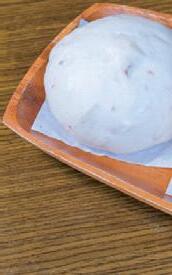
Off the edge of the Zhutian Station square, this sleekly modern café has been built “into” the concrete-wall ruins of a defunct rice mill, another project by the owner-operator of the aforementioned Yamato Café.



The Zhutian operation’s most arresting visual aspect is the “courtyard” in the rear. There was originally no courtyard here; the roof and large sections of the
exterior walls are gone. Private air-con dining rooms of full glass have been built along the inner perimeter, looking into the middle, providing patrons full privacy while still in a full people-watching public space. On the beverage side of the menu (w/ English), unusual options are the iced lemonade with pomelo and back-sesame milk; the food side has bagels and quiche, croissant, and butter roll treats.
ZHUTIAN STATION ( 竹田驛園 )
0989-603-718
No. 27, Fengming Rd., Zhutian Township, Pingtung County ( 屏東縣竹田鄉豐明路 27 號 )
9:30am ~ 5:30pm (closed on Monday)
www.facebook.com/jhutian
YAMATO COFFEE ROASTERS ( 驛前大和頓物所 )
(08) 771-2822
No. 26, Fengming Rd., Zhutian Township, Pingtung County ( 屏東縣竹田鄉豐明路 26 號 )
9am ~ 6pm
www.facebook.com/coffeebeanstock/
Old Zhutian Railway Station; new behindAnother farming-heavy locality, this is immediately south of Zhutian Township. “Chaozhou” refers to the Chaozhou area on China’s southeast coast, source of the original Han Chinese settlers.
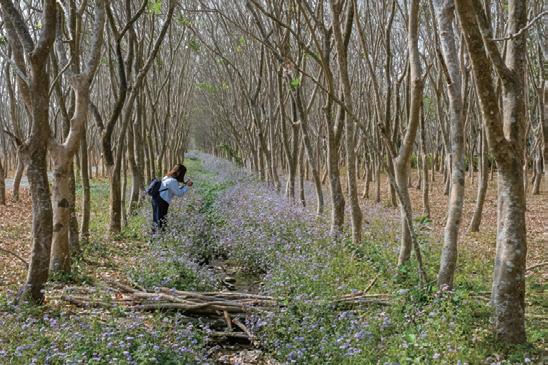
East of the town of Chaozhou, this young park is 1,005ha in size, 85ha open to the public. You’ll be meandering one of a series of large carbon-reduction reforestation projects being undertaken by Taiwan’s Forestry Bureau. Long pathways take you through tree banks, soil-improvement and farming demonstration areas, and an eco-pond zone, and along a section of a major Pingtung irrigation-canal system. This land was put to use for sugarcane production by the Japanese; they also designed the canal system, built with hired Paiwan-tribe labor. Abundant and good English signage explains all you see.
In Chaozhou town, this is a complex of government dormitory-residence facilities developed by the Japanese. It was the site of one of the major battles of the anti-Japanese resistance. After WW II the complex was utilized by the Nationalist government as government offices and housing for government-official families. Today the ruins are being steadily resuscitated, and have become a key Chaozhou tourist attraction.
Decorative faux trees in full sakura blossom brighten the entrance area. The first entrance-area building is a visitor center with displays explaining the architecture and site-regeneration process (Chinese).

The area around Chaozhou Circle, a small roundabout vicinal to the just-introduced cultural park that is Chaozhou’s busiest spot, is an urban-forest of “old shop sign” family-run eateries. A-Lun Ice Shop is an open-faced enterprise right on the circle; here the heat-beating shaved ice creations come with steaming-hot old-timey treasures such as glutinous-rice balls, mung beans, and taro. Off the circle, Lin Yao Hui Herb Tea , in a temple forecourt, sells delicious herb tea crafted from an old family medicinal herb store recipe. Also off-circle, A-Ming’s Steamed Buns uses distinctive local ingredients such as cane sugar, sesame, and taro.
ENGLISH AND CHINESE
A-Lun Ice Shop 阿倫冰店
A-Ming's Steamed Buns 阿明肉包



Chaozhou Circle 潮州圓環
Chaozhou Township 潮州鎮
Dr. Ikegami Ichiro Library 池上一郎博士文庫
50s Village Grocery Store 五十年代鄉下人家柑仔店
General's House 將軍之屋
Linhousilin Forest Park 林後四林平地森林園區
Lin Yao Hui Herb Tea 林耀輝青草茶
Mount Banping 半屏山
Paiwan tribe 排灣族
Pingtung Branch Tobacco Re-drying Plant 屏東支局葉菸草再乾燥場
Pingtung Civic Park 屏東縣民公園
Pingtung Tobacco Factory 屏東菸葉廠
Pingtung Sugar Factory 台糖屏東總廠
Shengli New Village 勝利星村
Small Town Ramble Year 小鎮漫遊年
Star Plaza 星星廣場
V.I.P. Park 遺構公園

Yamato Hotel 大和旅社
Zhutian Township 竹田鄉

The most-times patient, typhoonsometimes raging Ailiao River has carved a magnificent high-wall valley deep into the central mountains. As you approach its tall, imposing mouth from the plains, can you hear it? From valley’s inner recesses come calls from native warriors standing high on mountain slopes, welcoming you to visit and know their people.
Pingtung County is home to members of the indigenous Rukai and Paiwan tribes, indigenous folk constituting about 7% of the approximately 800,000 total population. The tribes, which share many cultural traits, intermix in Neipu, Sandimen, and Majia townships. Neipu is a farmpredominant flatlands area east of Pingtung City. Majia and Sandimen are lowmountain areas to Neipu’s east and northeast, respectively. Wutai Township, a remote high-mountain region to Sandimen’s east, is predominantly Rukai.
The region has a splendid concentration of tourist-welcoming workshops operated by native artists and artisans, eateries where you can partake of the distinctive indigenous culinary traditions, and manifold other sites of interest showcasing the thriving local native culture.
TEXT RICK CHARETTE PHOTOS ALAN WEN, VISIONWhat is known as Wutai Village is a collection of settlements far up the Ailiao River valley, along wide, well-maintained Provincial Highway No. 24. The first three destinations below are in the largest and most remote enclave, also highest up a mountainside.




Yanban (Slate) Lane is at the top of this tiered settlement. Stretching 500m, it is paved with slate slabs and lined with traditional slate-stone buildings. On the façades are symbols proclaiming the social status of the owner: elite member of the tribal nobility (a hundred-pacer viper; see note in museum entry below), regular civilian, elder, hunter.
The Rukai are renowned as deft sculptors, and as well along the lane you’ll come across tribal scenes depicted in large stone reliefs and sculptures: tribal warrior heroes, wise elders with wizened faces, women engaged in ancient-way weaving… and one young hunter with wild boar on shoulder, yelling out into the valley ether – one of the above-mentioned warriors “calling out to you in welcome.”

This place of worship, just beyond the lower end of Yanban Lane, is a church of unique beauty in one of the most majestic settings such places exist. Powerful mountains fill your photo backdrops. Deliberately, the castle-like church, built by a famed indigenous artist in 1966, is raised high above other surrounding village buildings on a base faced by massive stone blocks and seems to float just below heaven.
Complementing the traditional Christian motifs such as two sizeable sculptures of angels playing cornets on the roof are a plentitude of idiosyncratic Rukai cultural expressions. On the roof and behind the altar are two tall, thick cypress crosses. Atop a stone-block tower beside the church is a towering sculpture of a warrior-chief in ceremonial dress, church bell in hand, calling people to worship – and “calling out to you in welcome.”
WUTAI PRESBYTERIAN CHURCH ( 基督長老教會霧台教會 ) (08) 790-2204
No. 76, Zhongshan Lane, Neighborhood 9, Wutai Village, Wutai Township, Pingtung County ( 屏東縣霧臺鄉霧台村 9 鄰中山巷 76 號 ) www.facebook.com/vedai.kiwkai
The Rukai Culture Museum (entry fee) is toward the bottom of the settlement. It stands at the rear of a large round-shaped terrace plaza that is this community’s public-gathering heart. This is one of just two large, open flat areas – the other is the sports ground of the elementary school, just uphill. The plaza is the one spot where you’re likely to sit down amidst townsfolk; Taiwan’s indigenous peoples tend to be retiring with strangers, and the locals hang out here enjoying the big shade trees and unobstructed breezes. There’s a small drinks/snacks cabin with picnic tables.

The plaza, laid with slate slabs, looks off into the vast space of the mountain valley beyond, other Rukai villages seen on the steep slopes in the distance opposite. A giant traditional-style swing is in the center, used in iconic Rukai boy-girl romancing and wedding rituals. Large statues of Rukai males and females in varied traditional attire are lined up at the plaza’s edge.

The large three-story building that the museum is housed in has a façade of flat slate stones intricately pieced together and is ornately bedecked with Rukai totems, among them the hundred-pacer viper. Traditional Rukai belief is that they are descended from this snake and that it is a guardian spirit. Inside is a treasure-house of relics and explanatory information (Chinese; audio narration also provided). Perhaps the most visually entertaining display explains the techniques used in building slate homes and other structures, with a wonderful section of miniature mockups of individual Wutai Township buildings, showing the surprising stylistic variation (each Rukai building is given an identifying name). Another display explains the deep symbolism of traditional tribal beadwork, for which the Rukai/Paiwan are also renowned. And another intriguing exhibit shows how traditional fish and hunting traps were created and used.


This shop, and the one below, face each other across Provincial Highway No. 24 in a settlement just west of, and lower in elevation than, the one we’ve just visited. Collectively the two enclaves are commonly referred to as the Upper Wutai Community. These two food-andbeverage operations are popular stopping-off joints for tourists exploring the region.

As you approach Lrimumu Teke, it’s clear what the signature offering is at this open-front vendor – visuals of delectable donuts abound. The specialty is deep-friedbefore-you doughnuts, topped with powdered sugar, made with millet. Foxtail millet is a staple crop for the Rukai and other Taiwan tribes, used to make wine and in foods such as cinavu (meat mixed with fermented millet and powdered taro wrapped in leaves and cooked), and celebrated at their renowned annual millet harvest festival.


While Lrimumu Teke is set up on the stone-fenced narrow porch of a slate-façade residence, Shenshan Aiyu is set up in a street-facing courtyard fronted by the traditional-style low stone fencing.


A cooling bowl of aiyu jelly is a favorite Taiwan summer treat. Here it’s combined with another beloved summer tradition, shaved ice, which is served with various sweetened goodies. On the menu are aiyu jelly ice with persimmon and lemon, with fermented millet, and with mung bean, as well as the signature creation, assorted (i.e., all of the above gems) aiyu jelly. In the courtyard is rustic Rukai-style seating at tables/benches made with thick slate slabs, and on the residence’s roof is shaded picnictable seating from which patrons can look out over the settlement’s lower farm-grid area into the deep valley abyss.
Aiyu jelly is made from the seeds of a creeping vine fig that flourishes in forest 1,200~1,900m in elevation.


SHENSHAN AIYU ( 神山愛玉 )
0933-684-700 No. 16-1, Shenshan Lane, Wutai Village, Wutai Township, Pingtung County ( 屏東縣霧台鄉霧台村神山巷 16 之 1 號 ) 9am ~ 5pm (closed on Mon. and Tue.)
www.facebook.com/Wutairukai
LRIMUMU TEKE ( 莉姆姆的歌 )
(08) 799-7171
No. 23, Shenshan Lane, Wutai Village, Wutai Township, Pingtung County ( 屏東縣霧台鄉霧台村神山巷 23 號 )
1pm ~ 6pm (from 9am on Sat. and Sun., closed on Mon.) www.facebook.com/LimumuTEKE
Millet donutsJust southwest of the park is Rinari Village, a slopeland settlement that looks over the plains. Western, especially European, visitors will experience a sense of the familiar-yet-exotic here. The neat grid of tidy streets sports copycat-design A-frame and twin homes, all two stories, all wood-built. This young place is a resettlement of three high-mountain Rukai/Paiwan villages that suffered severe damage in an infamous 2009 typhoon. In striking yet harmonious contrast with the European-style architecture is each abode’s traditional Rukai/Paiwan slate-built patio, complete with low slate-slab fencing and seating, which tribal members call their “living rooms.” The exteriors of many homes are standalone artworks, brilliant with etchings, paintings, and drawings depicting the stories, customs, and histories of the resident clans.
The tribe’s younger generation has developed Rinari as a tourist-beckoning attraction, and you can experience guided tours, song-and-dance sessions, handicraft DIY, indigenous-fare dining both simple and upscale, and home-based shops selling traditional-style crafts created by masterly matriarchs.



As you approach the gaping Ailiao River valley mouth while crossing the wide Gaoping River plain, you get views of a settlement prominently laid out on a plateau on its north side. This is Sandimen, perhaps the region’s most tourist-visited indigenous village.
Our quest here, however, is the attraction spread out on a plateau on the opposite side, the Taiwan Indigenous Peoples Cultural Park. This is one of the world’s biggest theme parks focused on indigenous cultures, with a splendrous scope of knowledge-enhancing and entertaining experiences. There are first-rate replicas of traditional Taiwan indigenous architecture, dynamic song-and-dance performances, a museum dedicated to the potent sculptural artistry of the many different tribal peoples, DIY workshops where you create your own indigenous-style handicrafts, a hiking trail to higher ground and a park overlook, and freshcooked native foods aplenty, featuring many ingredients you will no doubt not have come across before.
Exhibit Live performance
This usually serene recreation area is located right off County Highway No. 185, which moves north-south along the base of the mountains. It takes up a narrow low-mountain valley, stretching from the valley’s mouth where it debouches onto the plains all the way up to its head, about 2.5km inland, where the isolated, multi-tiered Liangshan Waterfall tumbles in seeming slow motion into a tight gorge piled up with massive boulders.
The area’s lower section is primarily family-oriented: a visitor center, small park with swings and whimsical installation artworks, pond with resident honking geese, camping facilities, oh-so-cute “Hobbiton village,” goat enclosure and, where the valley narrows dramatically, large covered rest facility where fresh-made lemon aiyu jelly, local-fruit juices, coffee, and tea are sold (weekends/ holidays). The visitor center, decked out with an alluring indigenous-symbol theme, has English brochures, handson displays of tribal attire and handicrafts, and a large, well-wrought regional scale map (all places in this article are within the Maolin National Scenic Area; maolin-nsa. gov.tw).

You enter an utterly different world in the upper valley, traversing the 1.5km Liangshan Trail. The walls come in ever closer, the hillsides become ever steeper and climb higher and higher. The first trail section is mildly demanding boardwalk stairs, which lift you high up the south-side cliffside. After this the grades are easy, and the valley bottom steadily rises up to meet you. While zigzagging along in the shade provided by the dense forest, a bonus (on relatively hiker-light days) is the incessant song of the wild birds.
TAIWAN INDIGENOUS PEOPLES CULTURAL PARK ( 台灣原住民文化園區 )
(08) 799-1219

No. 104, Fengjing, Beiye Village, Majia Township, Pingtung County ( 屏東縣瑪家鄉北葉村風景 104 號 )
8:30am ~ 5pm (closed on Mon.)
www.tacp.gov.tw
LIANGSHAN RECREATION AREA ( 涼山遊憩區 )
(08) 799-3520
No. 14-20, Liangshan, Liangshan Village, Majia Township, Pingtung County ( 屏東縣瑪家鄉涼山村涼山 14-20 號 )
8am ~ 5pm (from 7am on weekends and holidays) www.facebook.com/liangshan.co
ENGLISH AND CHINESE
Ailiao River 隘寮溪
aiyu 愛玉
Gaoping River 高屏溪
Liangshan Trail 涼山步道
Liangshan Waterfall 涼山瀑布
Maolin National Scenic Area 茂林國家風景區
Paiwan 排灣
Rinari Village 禮納里部落


Rukai 魯凱
Sandimen 三地門
Upper Wutai Community 上霧台部落
Wutai Village 霧台村
Wutai Township 霧台鄉
Yanban Lane 岩板巷


Breezy Blue excursions take bubbly tourists in old-timey railway carriages pulled by a onceupon-a-time diesel engine from Pingtung County’s farm-stitched plains through the scenic central-mountains spine of the south to the mountain-crowded, deep valley-pierced coastline of southern Taitung County. All aboard! The trains travel the South Link Line –from Pingtung’s Fangliao town to Taitung City.
Taiwan folk use their national rail network almost as casually as people use city buses or subway systems elsewhere. The first-rate rail system loops the island, joining up all major urban centers as well as scores of smaller stops in between them. You’ll commonly see students in uniform, grandmas with shopping bags, office workers, etc.
The trains of the regular rail network and the Taiwan High Speed Rail system that was launched in 2007 (THSR trains ply the island’s west side) are also commonly the first choice for fun-outing travelers, taking them either to final destinations or to jump-off points. In this article we travel the South Link Line, opened in 1991 to complete Taiwan’s round-island loop, which whisks sightseers from Pingtung County and the azures of the Taiwan Strait to Taitung County and the inshore marble-green and offshore steel-blue waters of the Pacific side, on the way piercing through many tunnels in rugged, sparsely settled mid-height mountains.
The "Breezy Blue" train traveling along the Taitung coastThe South Link Line officially extends from the Pingtung coast-side farm/fish farm market town of Fangliao, south of Kaohsiung City, to Taitung City. Taiwan’s bottomless legion of railway-experience gourmets and gourmands have had Fangliao as a key travel target since October 2021, when the Breezy Blue tourism train was launched on the South Link Line. One Fangliao-Taitung City round-trip service is offered daily.
A full ten months was spent restoring the blue-façade diesel-powered engine and carriages used. Such blue trains were formerly a common sight around the island handling slow milk runs. Breezy Blue, from the 1950s, is currently Taiwan’s oldest operating train. Note that this is an authentic yesteryear experience – no air-con, windows opened for breezes, and electric fans used.
The Taiwan Railways Administration (TRA) has outsourced the Breezy Blue service to the large and deeply experienced Lion Travel enterprise. You have your choice of multiple-day on/off tours visiting the various stations and nearby areas along the way, or single-day guided outings.
Steps away from Fangliao’s railway station is the Breezy Blue Station , sporting a façade design mimicking a moving train. Inaugurated in summer 2022, this is a onetime dormitory for railway workers today doing service providing travel info and selling both themed souvenirs and drinks/snacks.

A few steps further is the Fangliao Railway Art Village. Both this complex and Breezy Blue Station look out at Fangliao’s train yards and mountain backing. The village is a grid of multi-story railway-employee dorms, offices, and other facilities given new missions as touristbeckoning artist studios, cafés, and eateries.
BREEZY BLUE ( 藍皮解憂號 ) +
BREEZY BLUE STATION ( 藍皮意象館 ) (08) 820-3520 No. 15, Chuyun Rd., Fangliao Township, Pingtung County ( 屏東縣枋寮鄉儲運路 15 號 )


9am ~ 6:30pm (until 6pm on Mon. and Wed.; until 12pm on Tue.) www.facebook.com/breezybluetrain event.liontravel.com/zh-tw/railtour/breezyblue/products (Chinese)
From Fangliao the tracks stay near the Taiwan Strait, then before Fangshan Station begin to climb and turn inland. Close to the station are the Fangshan Leisure Farm , producer of succulent Irwin mangoes along with lychees and longans, and the Fangshan Post Office , a place of sunny-color localtheme exterior artwork.
 Fangshan Post Office
Fangshan Leisure Farm
Fangshan Post Office
Fangshan Leisure Farm


After passing Fangliao you immediately begin the run of railway tunnels and bridges that bring you through the muscular mountains to the Pacific’s edge; these then continue up-coast to the Zhiben area. In between the tunnels you’re regaled with views of tight valleys and boulder-strewn waterway beds, compact fruit orchards and vegetable plots, plus a few majestic waterfalls, especially after rains.
The station areas on the Pacific side also abound with destinations popular with tourists. Duoliang Station is a destination in itself. Perched high above the parallel coastal highway up a steep switchback road, the station’s roof sections serve as viewing platforms for terrific passing-train shots with ocean, highway, railway-tunnel entrance, and mountain as background.

Further up the switchback road is the breeze-fanned Sunrise Driftwood Workshop, in a former elementary school repurposed for indigenous-tribe artists specializing in eco-friendly works concocted from driftwood and abandoned materials. Enjoy the mountain-herb-infused ice coffee and creative indigenous cuisine here, especially the unique dragonfruit doughnuts, and the sweeping tree-shaded coastal view.

Continuing north, a few kilometers further on is Jinlun Station. A quick walk through small Jinlun town brings you to Kiokai Ni Santo Yosef ; this title is the rendering of “Church of St. Joseph” in the language of the Paiwan tribe. This is a Roman Catholic place of worship built in the 1950s and renovated in detail in 2007. You’ll find an intriguing combination of Western and indigenous visual motifs; for example, Crucifixion figures are adorned in traditional Paiwan attire, and images of snakes, revered as a tribal protector, abound.
Immediately south of the railway station, a tunnel delivers you under the tracks onto attractive Jinlun Beach . The setting is dramatic. As you emerge, immediately above is a soaring coastal-highway bypass section. The beach is isolated, with steep hillsides coming right to the water at both ends. Along the back of the beach Taiwan’s Forestry Bureau is nurturing a young woodland strip to maintain soil stability and capture carbon.
Sunrise Driftwood Workshop near Duoliang Station Jinlun Beach Huayuan BayAmis tribe 阿美族
Duoliang Station 多良車站
Fangliao 枋寮
Fangliao Railway Art Village 枋寮鐵道藝術村
Fangshan 枋山
Fangshan Leisure Farm 枋山休閒農場
Fangshan Post Office 枋山郵局
Flowing Lake 活水湖
Huayuan Bay 華源海灣
Jinlun Beach 金崙海灘
Jinlun Station 金崙
Kiokai Ni Santo Yosef 金崙聖若瑟天主堂

Paiwan tribe 排灣族
Pipa Lake 琵琶湖
South Link Line 南迴線

Sunrise Driftwood Workshop 向陽薪傳木工坊
Taimali Station 太麻里
Taitung Forest Park 台東森林公園


Taitung Mountain-Ocean Bikeway 台東山海鐵馬道
Zhiben 知本
Zhiben Forest Road Waterfall 知本林道瀑布
Zhiben National Forest Recreation Area 知本國家森林遊樂區
The population of Taimali Township, served by Taimali Station , is about one-third indigenous, Paiwan and Amis. The area gets especially busy in late summer when the picturesque annual daylily bloom takes flight in the local hill plantations. Their tasty orange buds are used in tourist-eatery cooking –battered and deep-fried, used in pork-rib soup, etc.
Hardly more than a strong stone’s throw from the station is the long, gently arcing Huayuan Bay, a lovely sightseer stoppingpoint. A petite highway-side park along the bay’s north section has winning public-art installations popular as photo props.

Inland from Zhiben Station up the Zhiben River valley, home to one of Taiwan’s earliest-developed hot-spring resort areas, you’ll also find the Zhiben National Forest Recreation Area (recreation. forest.gov.tw) and Zhiben Forest Road Waterfall. The lofty, thin 50m-high waterfall is found about a kilometer up-valley beyond the Yawan Spa Hotel along a well-maintained forestry road. Formosan rock macaque spottings are pretty much guaranteed along the shady route. The 110ha forest area has a trail-web that transports you high and low across a river-overlook mountain slope. Its stars are the steep Brave Man’s Slope Trail (792 steps!) and magnificent centuries-old white-bark banyan trees.
Taitung Station is on Taitung City’s northwest edge. The 280ha Taitung Forest Park runs along much of the city’s north side to the sea. The easygoing 21km Taitung MountainOcean Bikeway wends its way through the forest (bike rentals available). In the east end are small, shallow, crystal-clear lakes fed by underground springs. Serene Pipa Lake is the most aesthetically engaging, sprinkled with wood-built lookouts and busy with fish and bird life. Flowing Lake, far larger, is a perfect rectangle that locals have merrily dubbed the “World’s Largest Swimming Pool,” with public swimming and water-fun facilities (fees for each).
Scenic road in Taimali Kiokai Ni Santo Yosef Pipa LakePlay all day by and on the salty waters of the Dapeng Bay National Scenic Area, a short 30-minute drive south along the coast from Kaohsiung City’s center, and reward yourself after the sun’s disappearance with deep-sleep overnight rejuvenation at one of the refined young inn-style accommodations located near the bay, a giant mangrove-fringed lagoon.
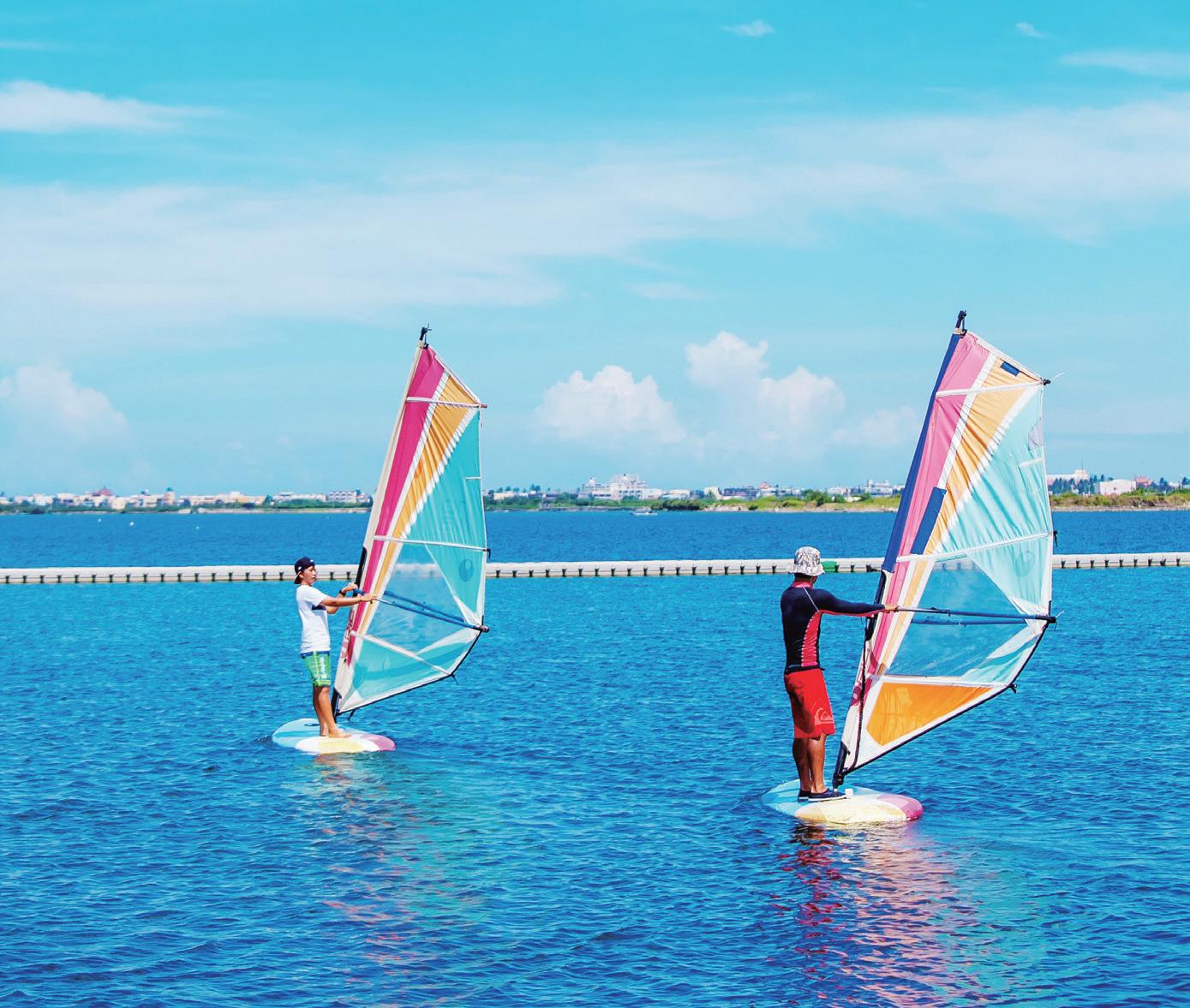

The coast-side harbor town of Donggang is immediately north/ northwest of Dapeng Bay. It is the heart of a township long known for fishing, fish farming, and superb inexpensive seafood eating, and now also as the home of the national scenic area. The youthful Wan Dao B&B is a short drive north of the lagoon, off the town’s northeast edge. It’s in a comparatively quiet area, mostly open space in front, a large indoor swimming-pool facility on its right, a large motel along the street behind.
Note that in Taiwan the terms “B&B” and “homestay” are used loosely, and as with Wan Dao and this article’s two other recommendations, many are in fact dedicated-built inn-style facilities, owners not resident.


Wan Dao has ten guestrooms, each sleeping 2~4 people, spread out from the second to fifth floor. Each is individually presented on the official website. The décor theme is modern simplicity, with liberal use of light/dark woods and brick, along with coolto-the-foot ceramic flooring. All rooms offer a southerly view through windows and/or balconies, and hallway windows present north views out the back of the building.
The rooms on the fifth floor have a south-facing wall of glass and are high enough to put Dapeng Bay into view, and also have tubs in large bathrooms in front of floor-to-ceiling glass sections. These rooms also have a comfy outdoor deck. The most popular room for families is 202, which has a large wood-built bunkbed, the upper bunk crafted like a treehouse.
Much of the first floor is taken up with a large reading/dining area. Breakfast, available for a fee, consists of a clubhouse-style sandwich, small salad, fresh local fruits, and a beverage of choice (coffee, tea, fruit drinks, soybean milk). Other amenities include gratis use of bicycles (first come, first serve) and gratis access to the swimming-pool facility next door.

Along its south side, only a narrow strip of land a couple of hundred meters wide separates Dapeng Bay from the Taiwan Strait. Most of the residents here are involved in fishing and/or fish farming, and you can see many rectangle fish ponds. Paddle-wheel aerators are constantly turning, filling the air with the soothing sound of churning water, and egrets, herons, and swallows are all about, on the hunt for a meal.
Water Reflections at Ease, like the Isvara Inn introduced below, is very close to the Qifeng Wetlands, which we visit later in this article. It has just four rooms (for 2~4 people each), all unusually large, on its second and third levels, with a spacious reading and tea-enjoyment area on the first level. Pleasant gardens edged by decorative trees are found directly in front and on the two sides, with tree-shaded seating provided. The strait is visible from the top-floor rooms.
The homestay was opened in 2014 by a now former fishingfamily couple that lives right next door. They operate both this and the Isvara Inn (opened in 2019), located across the street. Every aspect of the two inns was designed by the husband, from the exterior and interior design to the decor. There is a strong Zen air at Water Reflections – the husband has a passion for Taiwan timber, and everywhere you look are furnishings and decorations



(08) 875-3330
No. 181, Nanping Rd., Nanping Borough, Donggang Township, Pingtung County ( 屏東縣東港鎮南平里南平路 181 號 ) www.wrae-hotel.com (Chinese) www.facebook.com/waterreflectionsatease
made from homegrown cypress and cedar – from rustic driftwood sculptures to commissioned tables, chairs, bed frames, and so on to flower holders and jars. The air is suffused with the soothing aromatic scent of the woods.

A gratis breakfast is served in a stylish new purpose-built, high-ceilinged hall opened in late February, also designed by the husband. The fare is Chinese style, accompanied by Westernstyle breads and homemade jams. Afternoon tea and dinner are also offered (fee), the former featuring homemade Western-style treats, the latter focused on fresh Donggang seafood treasures.
 Guestroom
Guestroom Building
Wooden sculptures and furniture
Guestroom
Guestroom Building
Wooden sculptures and furniture
This is a five-story facility with a viewing terrace on the top level. Its exterior/interior design, using the owners’ own description, is “industrial loft style.” The dominant motif, outside and inside, is full walls and ceilings of exposed concrete, the feeling of primitive rawness softened with wall sections here and there painted in bright and bold pastel colors.

On the first level the same Zen ambience found in Water Reflections at Ease is in force, with extensive use of cypress and cedar in the guest leisure area (patrons here also now enjoy their gratis breakfast and other culinary sessions in the aforementioned hall across the street).

Great single slabs of wood serve as the tops on long tables, as section partitions, and as wall art. The single most eye-catching element is the long service counter, crafted by the husband using large driftwood pieces.

There are 15 guestrooms in total, for 2~4 people each. Adding to the minimalist modern “industrial loft” character of the exposed-concrete walls and ceilings are such touches as large bare lightbulbs hanging by long cords from ceilings. The cypress/cedar furnishings theme is continued here as well, but on a much more modest scale, with comparatively small and visually quiet tables, chairs, bedstands, etc. that are also limited in number.

The viewing terrace on the top level affords grand views both toward the sea and toward Dapeng Bay, numerous fish-farm ponds before the bay and the lofty line of north-south southern mountains beyond. There are also commodious covered decks on the second and third level, also looking out toward the bay. Rather than the rustic wood items seen elsewhere in the building, the furniture items here generally have more refined contours. On the first floor are such public guest-use facilities as a water dispenser and large refrigerator. Washingmachine facilities are also available (ask staff first).
ISVARA INN ( 自在旅店 ) (08) 875-3999, 0955-750-272

No. 190, Nanping Rd., Nanping Borough, Donggang Township, Pingtung County ( 屏東縣東港鎮南平里南平路 190 號 )
www.isvara-inn.com (Chinese) www.facebook.com/isvara.inn.hotel
Covered deck on second floor Guestroom Reception areaDapeng Bay is southwest Taiwan’s largest lagoon, totaling 532ha, home to the island’s southernmost mangrove forest. Now a protected eco-area, during the 1895~1945 colonial reign of the Japanese it was used as a military seaplane base – various facilities remain, such as fortified control towers and a restored Baroque-style staff building – and for decades after was used for oyster production. On the north side is The PenBay National Leisure Zone, where a wide range of both water- and landbased activities is offered, from kayaking, canoeing, windsurfing, pedal-boating, and rowboating to bicycling and even go-karting.
The breeze-swept, wave-lapped Maritime Building Café is right out in the middle of the lagoon. Reached by a long, thin pedestrian-use causeway from the PenBay area, it is within a large dedicated-built faux Spanish church complete with vaulted ceilings and tall, narrow church-style windows.

The sizeable Bayside Wharf area is on the lagoon’s south side. Sightseeing boats launch from here (some offer oyster roasts on tours), and there are also small sailboat and canoe rentals. If all you’re interested in is the landlubber views, two large cafés with alfresco umbrella-shade seating await.

 Maritime Building Café
Inside the "Spanish church"
Maritime Building Café
Inside the "Spanish church"
The mangrove-dense 6.5ha Qifeng Wetlands are just off the lagoon’s southeast corner. The fish farms central to local economic life formerly resulted in heavy pollution and silting in the bay. Numerous ponds have now been converted into wetlands, purifying water from working farms and wastewater from surrounding communities before entering the bay. Boardwalk pathways dotted by lookouts stretch along the water’s edge and right across one pond, and there are steady sightings of the White Wagtail, Common Moorhen, and other avian beauties.
The photo-perfect Dapeng Bay Bridge leaps like a rainbow across the narrow Dapeng Bay mouth. Resembling a sail, this is a single-column, cable-stayed bridge – and Taiwan’s sole drawbridge, accommodating large craft entering/exiting the bay. Great camera captures with the sizzling-red/orange setting sun behind are enjoyed from the PenBay zone.

The quiet, sun-drenched Dapeng Bay Bikeway is a wide, paved 11.9km bike/pedestrian path that takes you all the way around the lagoon. It is generally flat, save for your “flight” across the Dapeng Bay Bridge. Marvelous for birding, at times you are right beside the wide lagoon, and at times you sail through mangrove forest and other treed areas. The loop is part of the “Pingtung Rainbow Bicycle Network,” over 460km long.

This Donggang town festival celebrates the April~June bluefin tuna season. Experience unbeatably fresh melt-in-your-mouth sashimi as well as tuna culinary gems prepared in many other ways. Donggang is also renowned for highquality sakura prawns and oil fish roe. Learn about its marine catch and fishing techniques at the Donggang Fishery Museum, near the harborside Donggang Huaqiao Seafood Market.
ENGLISH AND CHINESE
Bayside Wharf 濱灣碼頭
Dapeng Bay National Scenic Area 大鵬灣國家風景區
Dapeng Bay Bikeway 大鵬灣單車道
Dapeng Bay Bridge 大鵬灣跨海大橋
Donggang 東港
Donggang Fishery Museum 東港漁業文化展示館
Donggang Huaqiao Seafood Market 東港華僑魚市場
Maritime Building Café 海上教堂咖啡
Pingtung Bluefin Tuna Cultural Festival 黑鮪魚觀光文化季
"Pingtung Rainbow Bicycle Network" 屏東彩虹自行車道

Qifeng Wetlands 崎峰溼地
The PenBay National Leisure Zone 大鵬灣國際休閒特區
 Qifeng Wetlands
Qifeng Wetlands

In the early 2000s, prompted by a drop in the price of betel nuts, some of Pingtung County’s farmers began planting cacao trees. This new crop flourished, fuelling a growing domestic interest in the sweet stuff that comes from them and paving the way for a boom in Taiwan’s homegrown chocolate industry.
Despite its newcomer status, Taiwan punches well above its weight in the world of chocolate – a fact attested to by the numerous local brands gilded with international awards. In the pages that follow, you’ll meet a trio of Taiwanese chocolatiers and chocolate makers based in Taipei City’s Da’an District, each with grand plans to center Taiwanese chocolate on the global stage.
It’s the Saturday before the Western Valentine’s Day (the Chinese world has a different traditional date, and celebrates both) when I meet Queenie Wu in her store, Q sweet, and it’s clear that I could probably have chosen a better time. There is a mass of overlapping pink order slips on one wall, and the staff attends to a constant stream of online inquiries in between fending off male customers on the hunt for the perfect gift for their loved ones. Despite this, I have Wu’s undivided attention as she shares her passion for the craft.
Born with chocolate in her veins (almost literally, since according to family legend her mother developed an appetite for chocolate during pregnancy), Wu’s childhood sweet tooth was indulged by a father who brought home exotic chocolates from his travels,
TEXT AMI BARNES PHOTOS YANG JEN POand these little souvenirs would set her on the path to becoming an award-winning chocolatier.



Wu describes establishing an artisanal chocolate company in Taiwan as feeling like she “was planting flowers in a desert.” Taiwan lacks a history of consuming such delicacies, and few people were interested in understanding the philosophy behind her culinary choices. Despite the challenge, she was unwilling to compromise, as evidenced by her attention to detail, like her insistence on using traceable, singleorigin cacao beans. While it’s easy to see why beanto-bar producers would place high importance on this element, Wu believes it is equally important for those wishing to craft fine chocolates. The overall quality of artisanal chocolates comes from two parts – of course, the chocolatier’s own creative flair is vital, but the variety of the cacao beans chosen is the canvas upon which their artistry is displayed.
Wu’s personal artistic touch, along with this commitment to quality raw ingredients, has borne fruit, and her little store is now an oasis for those discerning chocoholics who take their chocolate seriously. Between 2019 and 2021, she claimed no less than 17 awards in the International Chocolate Awards (ICA), catapulting her into the position of most-awarded chocolatier in Asia. Indeed, so esteemed are her creations that when former U.S. Speaker of the House and self-proclaimed “dark chocolate connoisseur” Nancy Pelosi landed in Taipei last August, she was gifted a box of Wu’s creative chocolate offerings, demonstrating the craftswomanship of Taiwan.

A particular source of pride is her “White Chocolate Comfort Fruits” series. This creation was a huge hit at the 2022 ICA World Finals in the category of white chocolate enrobed whole fruit, winning one gold and two silver awards. Cheng Yu Hsuan, the owner of Yu Chocolatier (see below), described his moment of


chocolate epiphany to me, likening the experience of tasting good chocolate to listening to a melody or hearing a symphony. I nodded at the time, fearing I would never experience it the same way he does. Later encountering Wu’s comfort fruit series, I finally got it. Wu’s series is like an LP, a mini album of the most exquisitely crafted tunes. Thematic connections tie the overall project together (the silken white chocolate, the
Q SWEET ( 巧克力菁點 )
(02) 2700-8088
No. 7, Lane 199, Sec. 4, Xinyi Rd., Da'an District, Taipei City ( 台北市大安區信義路四段 199 巷 7 號 ) www.qsweet.com.tw www.facebook.com/Qsweet.chocolate
Chocolatier Queenie Wu in front of her shop White Chocolate Comfort Fruits Chocolate barsIf Queenie Wu is the artist of Taiwan’s chocolate scene, Yang Feng-Hsu, with his self-styled chocolate lab and analytical approach to flavor profiles, is its scientist. Yang is the founder of Terra, a bean-to-bar chocolate manufacturer with a store in Taipei.


A bean-to-bar manufacturer, as the name implies, focuses on taking cacao beans and working them into bars of chocolate. Currently, Terra works with cacao beans from nine growing regions, and Yang estimates his store offers the greatest variety of single-origin bars in Taipei. For bean-to-bar chocolate makers, the origin of their beans is a matter of utmost importance. Much like coffee or wine, chocolate is affected by the terroir of its growing region (terroir being a French term encompassing soil quality, climate, and geography – the whole gamut of environmental conditions). And just as with fine wine or coffee, for chocolate fans there is a certain pleasure to be derived from decoding these nuances in flavor.
In addition to its single-origin bars, Terra’s signature item is its velvety nitrogen-infused chocolate drinks. Nitrogen coffee shops may have become a dime a dozen in recent years, but within the world of chocolate, Terra’s offerings are rather unique. “I’m afraid it sounds a little bit like a chemistry class, doesn’t it?” Yang apologizes after explaining how the chemical composition of nitrogen imparts a smoother, fluffier mouth feel. He has high hopes for the drink and dreams of exhibiting it at Salon du Chocolat – the world’s most prestigious chocolate exhibition – among the crème de la crème of the industry. For Yang, although these drinks may be somewhat avantgarde in the way the raw materials are treated, they are firmly rooted in the traditions of chocolate consumption – after all, chocolate’s entry point into the human diet was as a beverage.


 Chocolatier Yang Feng-Hsu
Chocolate-tasting space
Hot chocolate
Chocolatier Yang Feng-Hsu
Chocolate-tasting space
Hot chocolate
Asked how he tries to entice customers more at home sipping coffee, Yang shrugs and gestures expansively at the store’s interior: “That’s what the design is for.” Drawing on impressions gathered from his time spent in South and Central America, he has surrounded the store with leafy tropical plants and incorporated organic shapes and earth tones – a smooth boulder supports the display of chocolate bars, and the arc of the serving counter echoes the form of a cacao pod – all elements that fare well in this age of visuals-first consumption.


Those who prefer their chocolate in solid form should try Terra’s Choco Flight – an NT$380 spread that includes a square of chocolate from each of the growing regions the store works with. Served on a wooden platter, the flight comes with a sheet of paper giving visual flavor profiles for each piece. Nine squares of dark chocolate in one sitting may seem like a lot – but tasting side-by-side in this way really allows the distinct flavors to stand out. Some have a brightly astringent quality, others are moodier and spicier, and my personal favorite, the Columbian one, has a slightly burnt note.

Anyone wishing to take their chocolate knowledge to the next level can sign up for one of Terra’s tasting classes. Guests are encouraged to explore the variations in taste and feel between different types of chocolate, including selections made by other well-known brands. “Of course we get students to sample chocolate made by other enterprises as well,” Yang says, smiling. “How can you learn to differentiate if you only try the good stuff we create?”

With the roles of chocolate scientist and artist taken, Cheng Yu Hsuan seems a good fit for the position of bard. For the past eight years, this chocolatier has dedicated himself to creating the kind of exquisite handcrafted chocolates that tell stories once they hit the tongue.


“It was coming up to Chinese Valentine’s Day and there was someone I wanted to impress,” he recalls when talking about what kick-started his exploration into the realm of fine chocolates. At the time, he was pursuing a degree in English literature, and while his classmates were preoccupied with consideration of literary techniques, Cheng was busy falling in love with the culinary arts.
He says that there’s little obvious connection between his degree and his current profession, but it’s clear that something from his student days has lingered. English literature majors famously have a propensity for thinking deeply and imparting meaning to everything – a tendency that is certainly true of Cheng. He talks about the “profundity of flavor”, of the transformative experience of tasting truly inspirational chocolate as being “like a journey, or a song,” and refers to his confections as being “spiritual”, the word carefully chosen to impart the dual meaning of containing alcoholic ingredients and of having a greater depth of flavor revealed by said additions.
Chocolatier Cheng Yu HsuanCheng’s lyrical approach has taken him into unchartered frontiers in the world of chocolate. More specifically, he has embarked on an adventure to discover Taiwan’s place in the confectionary cosmos, forging a path that is both a recognizable continuation of the European chocolatier tradition and also leading to something uniquely Taiwanese. A quick glance at the names of the bonbons on offer reveals some curious ingredients. Longan, sesame oil, jasmine, marinated plum, black tea, soy sauce – the flavors are not unfamiliar to the Taiwanese palate, but tasting them through the prism of chocolate opens up new dimensions.
Customers of Yu Chocolatier’s store are presented with an enticing array of pastries and chocolates under the counter’s polished glass. Those unsure of where to start might want to opt for the store’s signature Shibusa, a dark-chocolate mousse cake. This glistening disc is a chocoholic’s heaven – layers of crumble, ganache, sponge, and mousse are coated with chocolate glaze, each component taking a different plain dark chocolate as its starting point. Cheng describes it as being a world tour, and even with my own uncultivated palate, I sense what he means. Savoring each bite, I discern a vaguely spiced, warming note to the sponge and a bolder, maybe nuttier flavor profile to the crumble. And for chocolates, Cheng suggests starting with the eponymous “Yu”. This was the first chocolate
bonbon recipe that he perfected – the distillation of over two years and one thousand attempts.

Cheng’s creative vision has earned him multiple accolades. Yu Chocolatier was the very first Taiwanese brand to receive an award in the International Chocolate Awards in the Asia Pacific cohort, and the first to represent Taiwan at the Salon du Chocolat in Paris. More recently, he was included in 50 Next’s list of 50 Gamechanging Producers for his flair in delivering the beauty of Taiwanese culture through the medium of chocolate. Cheng, it seems, is already well on the way to achieving his goal of establishing a new Taiwanese chocolate tradition.
YU CHOCOLATIER ( 畬室 法式巧克力甜點創作 )


(02) 2701-0792

No. 10, Alley 3, Lane 112, Sec. 4, Ren'ai Rd., Da'an District, Taipei City
( 台北市大安區仁愛路四段 112 巷 3 弄 10 號 )
9am~6pm www.yuchocolatier.com.tw
ENGLISH AND CHINESE
Cheng Yu Hsuan 鄭畬軒
Queenie Wu 吳葵妮
"White Chocolate Comfort Fruits" 療癒果物系列
Yang Feng-Hsu 楊豐旭
Shibusa Spirits selectionEach day incredible numbers of cups are used just one time and then thrown away. While this is convenient, it’s also extremely wasteful and burdensome to our environment. An increasing number of consumers in Taiwan and around the world are now switching to more ec0-friendly and sustainable alternatives, encouraged by governments and aided by producers offering an ever-widening variety of reusable cups and accessories.
Echoing international environmental protection initiatives, the Taipei City Government banned beverage shops in the city from providing single-use plastic cups starting last December. More than 2,000 of these highly popular shops, including enterprises selling fruit juice and bubble tea, were affected. While the shops still provide single-use cups made of paper, many consumers now bring their own reusable
cups to make at least a tiny contribution to reducing waste and at the same time save a little bit of money (you usually enjoy NT$5 off each time you buy a drink when presenting your own cup). Are you considering switching to a reusable cup and accessories? Following is a short overview of related options currently trending in Taiwan.
When choosing an eco-friendly cup you want to look at the material it is made of and its size, shape, color, and functionality. Most cups are made of stainless steel, glass, ceramics, or plastic, each material having advantages and disadvantages. Steel is probably the ideal cup material (durable, easy to clean, heat retention, many shapes and sizes available). If opting for a cup made of another material you have to live with certain disadvantages such as easy breakability (glass), less heat resistance (plastic), and/or steeper prices (ceramics).
When deciding upon the size of your cup you want to consider the usual measurements for beverages sold in chain operations, like convenience stores and bubble tea counters. A small cup ( 小杯 ) is about 250ml in most cases but can be as much as 430ml (for example at McDonald’s), a medium cup ( 中杯 ) is 360ml~500ml, and a large cup is 600~900ml ( 大杯 ). If not sure whether your cup is large enough, ask the beverage shop staff before ordering. Reusable cups are generally priced NT$500~$1,500, depending on material, size, and functionality.
If you prefer drinking your beverages through a straw, you can buy a variety of straws, usually made of steel or plastic, some sold with a fitting cleaning brush. You can also find reusable straws made of plastic that can be unfolded to make washing them easier.
Because refreshing drinks in Taiwan often contain things like tapioca balls (“boba”/“pearls”) and bits of fruit, you want to make sure that your straw is wide enough if you want to enjoy such beverages. Some reusable cups come with an extra-wide straw and/or opening in the lid to allow sucking up peanut-sized morsels in the drink.
When carrying your own cup around, a drink holder comes in handy. Some cups are sold with straps that allow you to carry the cup on your wrist or on your shoulder, depending on the length. If you need to buy a holder separately, you can go from very simplistic with a braided-string design to very fancy with a stylish leather strap.
After having sorted out how to avoid buying one-use cups, you might want to go a step further and also purchase reusable cutlery sets for restaurant dining. Unlike in the West, in Taiwan these sets usually come with a spoon, fork, and a pair of chopsticks, but no knife. Also becoming more popular in Taiwan these days are food containers or bags to carry meals home without using any single-use plastic items.
The number of drink- and meal-related products on the market is increasing each day, and there are surely options that will allow you to join the growing environmentprotecting army of consumers!

After a long period of marginalization, indigenous creatives are increasingly taking ownership of the traditional arts and crafts of their people, which often draw from the land and their surroundings. Many choose to present their artworks and designs in innovative and modern ways, creating unique products that preserve their people’s rich heritage by keeping it relevant.
If you visit Fenglin Township in Hualien County during April and May, you might see Liu Da-wei (indigenous name Yawi Akin) riding his motorbike around in sweltering heat to collect fallen betel-nut leaf sheaths. Although in some indigenous cultures in Taiwan these sheaths are used as food containers and hotpot vessels, they’re usually just left by the side of the road to rot.
Collecting about 100 per day, Liu is pretty much solely responsible for acquiring the 2,000 to 3,000 pieces that his design venture, Nature, requires per year. The brand’s Chinese name, “Na-qiao,” sounds like “nature,” and literally means “taking sheaths.”
Launched in 2016, the two-person company offers simple and elegant daily-life products
made from this rarely used material, created with completely natural, eco-friendly processes. Currently, the team’s focus is on boxes of different sizes and “sheath paintings,” but they also collaborate with other businesses to explore new possibilities.
Liu, a member of the Atayal tribe who majored in Russian language studies in university, grew up in the city and did not have much contact with his culture before taking a job with the central government’s Council of Indigenous Peoples. He later joined an indigenous-event planning firm, where he was introduced to the betel-nut leaf sheath for the first time through an exhibition that also showcased shell ginger and bamboo leaves.


“There were many people using shell ginger in our tribal villages already,” he says, “but not many using betel-nut leaf sheaths. I thought, if I didn’t want to work in an office anymore, I could try to come up with a new way to use this type of sheath.”
The betel nut is important to many indigenous cultures, but both the cultivation of the plant and the chewing of the nut generally have a negative reputation in mainstream society. In addition to finding a new use for the plant and providing new meaning for it, Liu also wanted to encourage others to use natural materials from one’s environment, as his ancestors did. Although the Atayal don’t use betelnut sheaths, his business partner Lin Jun-yi’s (indigenous name Rahic La’om) Amis tribe does – but rarely in making products to be sold.

“We have seen more people using the sheaths in recent years,” Liu says, “and I hope that I can inspire other indigenous people to go look around their villages and see if there are any other eco-friendly creative ideas they can come up with.”
Perhaps one of the biggest challenges has been that both Nature creators are quite shy, making it difficult at first to promote their brand. They still mostly work with other designers or businesses instead of retailing directly to customers, but they try to participate in at least one design expo per year. Notable collaborations include a stone hotpot vessel-inspired light with designer Du Hsin-yu, which won a design award in Germany’s Red Dot design competition, and a room key card holder for Vivir Hotel, a boutique operation located in Jiaoxi Township, Yilan County.
“Vivir actually was interested in our boxes at first, but they were concerned that customers would think that the spots and blemishes on the sheaths were mold,” Liu says. “Instead, they thought that the material was suitable for their room key holders.”

They’ve also worked with floral artists and makers of tea ceremony ware. The latest partnership is with an embroidery design company. “I don’t know what the end product will look like yet,” Liu says with anticipation.
 Simple lunch boxes
Hotel key card holders
Artwork
Simple lunch boxes
Hotel key card holders
Artwork
After collecting the leaves, washing and compressing them, Lin crafts them into various products. In the beginning the leaves were collected in T-shirts and shorts – but on one occasion when the duo was out gathering together they got bitten by something that caused their entire arms to swell up and go numb. At one point, they outsourced the job to locals, but the sources were unstable, causing them to run out of material by October or November. They also thought about importing sheaths from Southeast Asia, which would save a lot of time and labor, but they just couldn’t go through with it as their original intention was to strictly make use of local materials. “Otherwise, it’s really tempting,” Liu says.
Both Liu and Lin have no design or craft background –Lin studied information management – and they’re still constantly adjusting their methods and techniques as they go. Liu says that betel-nut sheath is not commonly used because its thick and hard properties are quite difficult to control. At first, he would select sheaths with a certain aesthetic, but now he says he barely does, preferring to embrace the unpredictability of each piece – although arguments between the two do arise. Sheaths differ in thickness and fiber patterns, and they also dry differently, but that is also what makes each piece unique.
Eschewing chemical softening agents, the sheaths are soaked in cold water for four hours. Hot water is faster, but they don’t even want to use gas, Liu says. The material is then folded into the desired shapes and wind-dried. No glue or other fastening materials are needed to keep the folded boxes together, as the material retains its shape after hardening.
“To get the sheaths flat and even, we have to be very attentive throughout the process,” Liu says. “It’s not too complicated, but it requires a lot of patience and time.”

Although the Amis traditionally used these sheaths to fashion food containers, Liu doesn’t recommend customers do so with their boxes, as they may lose their shape and unfold with heat and moisture. They considered adding a protective film to the box, but again decided to stick to the idea of only using sheaths in their most natural state. “Some people know how to take care of natural materials, and they’ve shared photos of themselves using them as bento boxes,” he says.
Their light fixtures are unfortunately currently unavailable, as they’ve had trouble finding a metalworker who is up for such a delicate task and raw material prices have been soaring of late.
All in all, Liu hopes that the story of Nature can reach each customer, who, through this unique material, can gain a new perspective on society, culture and the environment.




NATURE ( 拿鞘 ) No. 81, Zhongmei Rd., Fenglin Township, Hualien County ( 花蓮縣鳳林鎮中美路 81 號 )
www.nihaonature.com www.facebook.com/Naturewor
ENGLISH AND CHINESE
Amis tribe 阿美族
Atayal tribe 泰雅族
Council of Indigenous Peoples 原住民族委員會
Du Hsin-yu 都新羽
Fenglin Township 鳳林鎮
Jiaoxi Township 礁溪鄉
Lin Jun-yi 林駿逸
Liu Da-wei 劉大衛
Leaves are collected in April/May
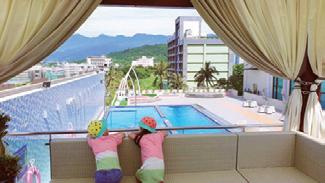

Taitung is well known for its beautiful mountains and rivers. Rice Resort Hotel is like an idyllic rural castle designed with the county’s specialty rice as its theme. The hotel has ten floors with a total of 100 guestrooms. Among its facilities are an outdoor swimming pool, a Chubby Choice Star Bar, a children's playground, a gym, and a massage area. It’s like a fun paradise for the whole family. In the high-ceiling firstfloor lobby of the hotel you will see design elements representative of Taitung, including lights in the shape of rice ears and grains of rice. The marble-textured floor and the beige walls give the space a soft and elegant feel.
No. 29, Xinxing Rd., Taitung City ( 台東市新興路29號)
Room Reservation Hotline: 089-229-968
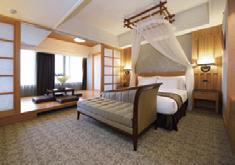
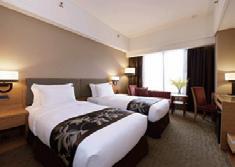
Banquet Reservation Hotline: 089-219-178
Taiwan’s well-known Caesar Park Hotels & Resorts chain has thoughtfully built the Caesar Metro Taipei hotel in Wanhua, a city district rich in culture and history, bringing new vitality to an old neighborhood. With its convenient location – sharing a building with TRA Wanhua Station and being close to MRT Longshan Temple Station – and having many historical and cultural sites close by, Caesar Metro Taipei is a top choice for travelers. With a total of 745 guestrooms, the hotel is the second largest in Taiwan. Exquisite double rooms are available for as low as NT$2,500 on weekdays; an additional NT$400 is charged on Friday and NT$800 on Saturday.
No. 167, Bangka Blvd., Wanhua District, Taipei City (台北市萬華區艋舺大道167號)
Tel: (02) 2306-6777 www.caesarmetro.com






Sheng Yuan Pharmacy in Taipei was founded in 1946 and has been in business for over 70 years. Always selecting the highestquality medicinal ingredients and providing the most-sincere service, the store has won praise from all walks of life. Strictly adhering to the concept of “creating medicine with conscience, running a business with integrity" the leading principle of the business has always been "making medicine is difficult, but we cannot save labor, the taste is expensive, but we cannot save material”, making the store well known near and far.
Hours: 8:30am~8:30pm (Mon.~Sat.); 9am~5:30pm (Sun. and public holidays) (all year except for Spring Festival period) Upon showing this ad, you will receive an "Empress Cixi Mask Travel Set" (Radiance 8g, Brightening 8g; limited to one set per person)

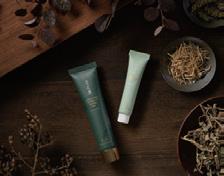
No. 181, Nanjing W. Rd., Datong District, Taipei City (台北市大同區南京西路181號)
Tel: (02) 2550-0331 sheng-yuan.com/en
Situated on Mt. Jiantan in Taipei, the Grand Hotel is a 14-story palace-style building constructed in 1970. There are two underground tunnels, under its east wing and west wing, respectively, which were designed as emergency escape routes for President Chiang Kai-shek. After opening the West Secret Tunnel earlier, receiving enthusiastic response by visitors, now, the 50-year-old East Secret Tunnel has been opened to the public as well. It has a length of 67 meters with a curvy design meant to prevent chasing soldiers from shooting at the fleeing parties, and walls with an uneven surface to enhance sound absorption. Since only a limited number of visitors can be accommodated, the East Secret Tunnel is only open to guests who come on corporate trips, attend state banquets, or opt for a special East Secret Tunnel Room Package.
No. 1, Sec. 4, Zhongshan N. Rd., Zhongshan District, Taipei City ( 台北市中山區中山北路四段一號)
Tel: (02) 2886-1818 ext. 1818 [guided-tour department] www.grand-hotel.org
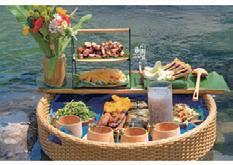
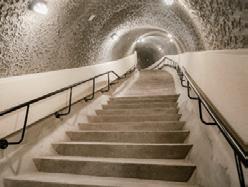
No. of rooms: 257

Room rates: City View Rooms from NT$7,800; Japanese/ Western Rooms from NT$16,800 (room rates are subject to 10% service charge)
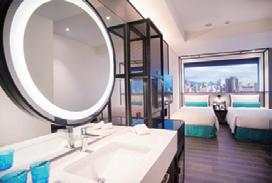

Desk personnel speak: Chinese, English Restaurants: Happy Garden (Chinese, Cantonese), Arcadia Café (Western style)
The hotel is located close to Hualien Harbor, allowing you to enjoy the most beautiful sunrise over the Pacific Ocean, the water’s color ranging from deep azure to light blue, the sun’s palette ranging from pale yellow to golden. Take in the marvelous views of the sun beautifully reflected by the sparkling sea from the infinity pool or one of the sea-view guestrooms. Staying at the hotel gives you easy access to the world-class scenic wonder that is Taroko Gorge as well as the bucolic East Rift Valley. Travel with friends and family and explore the mountains and the coast. Hualien will surely give you unforgettable memories!
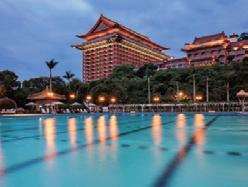
No. 51, Minsheng Rd., Hualien City, Hualien County (花蓮縣花蓮市民生路51號)
Tel: (03) 823-9988 Fax: (03) 823-0077 www.fullon-hotels.com.tw/hl/en/
Shanmei Village Tanaiku “Floating Restaurant” 1-Day Tour
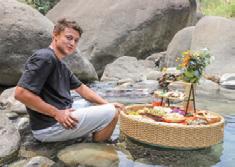
The Tanaiku “Floating Restaurant” 1-Day Tour (min. 4 participants) is a forest experience activity in Alishan Township’s Shanmei Village. After preparing your own lunch and tableware a knowledgeable guide takes you on a walk through mountainous terrain along a mountain stream to a secret “floating restaurant” location. There, you will enjoy your meal while floating in the pristine stream which is home to a large fish population. Great care is taken to ensure that no garbage, food, or oil is getting into the water. Sorting garbage and preserving the valley’s natural environment is in the spirit of the tribal ancestors who have always guarded the area with love in a sustainable way. This is an important message conveyed to every visitor who comes here. During the meals helpful staff is right by your side. Apart from ensuring safety, great care is taken to protect the environment and cherish the resources that nature has given us.
No. 51, Neighborhood 3, Shanmei Village, Alishan Township, Chiayi City (嘉義縣阿里山鄉山美村三鄰51號)
Tel: 0966-660-282 https://reurl.cc/eXGYo7
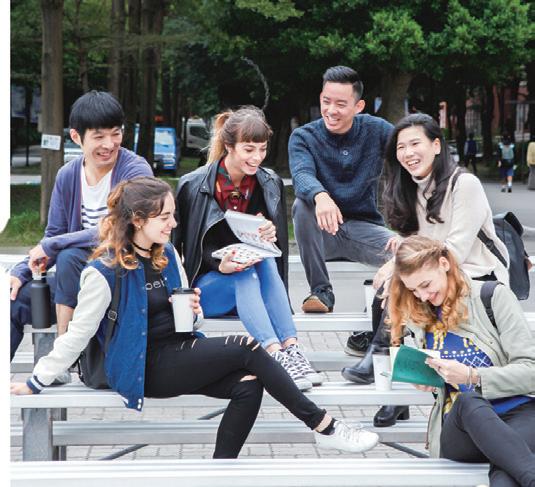
70th in Asian University Rankings
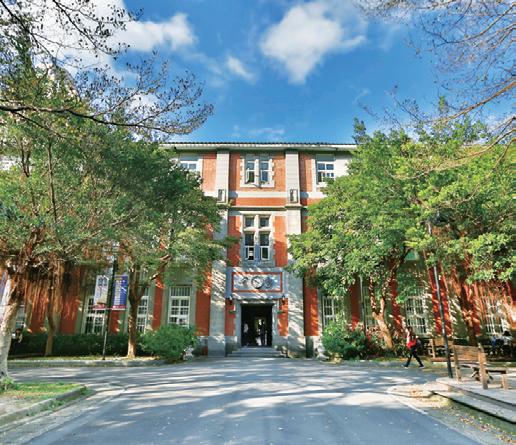
332nd in World Rankings (QS World University Rankings 2023)
1 1st in International Outlook among Taiwanese universities (Times Higher Education 2022)
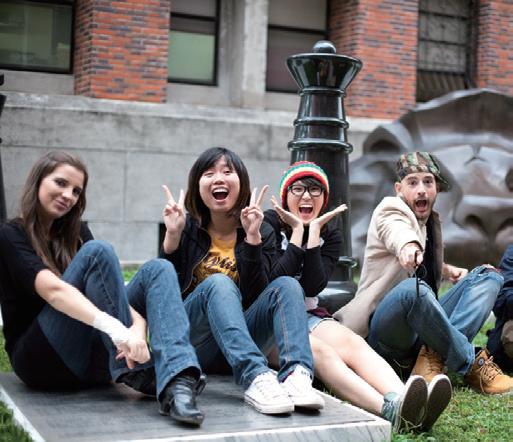
July 31,
390+ partner institutions around the world
Top 25 in Education (Times Higher Education 2022) Popular and Recommended Departments/Institutes for International
Students
The world-renowned Mandarin Training Center; online Mandarin courses offered (MTC Online)
Follow us on YouTube


Come and study with us!
Scholarships
1. Taiwan Scholarship (please contact the nearest diplomatic missions in your home countries)
Colleges Departments/Institutes Bachelor Master’s Doctoral Education Education ● ● ● Special Education ● ● ● Liberal Arts Translation and Interpretation ● ● English ● ● ● Arts Fine Arts ● ● ● Design ● ● ● Technology and Engineering Integrative STEM Education ● International Studies and Social Sciences Chinese as a Second Language ● ● ● International Human Resource Development ● Music Music ● ● ● Applications to Degree Programs – Office of International Affairs 886-2-7749-1272 ,
886-2-7749-1284 https://www.ntnu.edu.tw/oia/ intlntnu@ntnu.edu.tw

